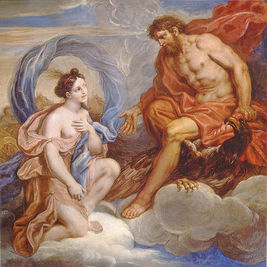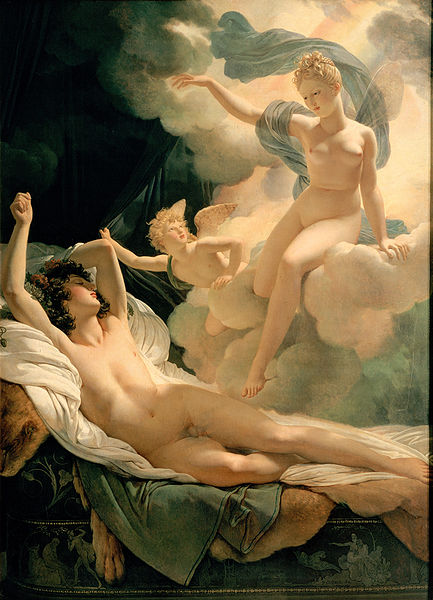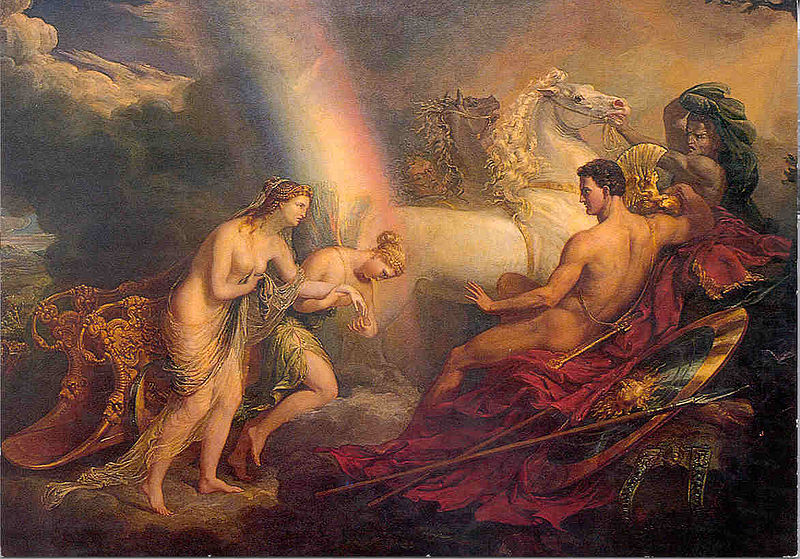THE GODDESS IRIS IN GREEK MYTHOLOGY
Today, Hermes is widely recognised as being the Greek messenger god, but less well known is the fact that he was only one of the messenger gods of the Greek pantheon. The role of messenger was duplicated by Triton, a messenger of Poseidon, and Iris, a messenger nominally of Hera.
Iris Goddess of the Rainbow
|
In Ancient Greece, Iris was the Goddess of the Rainbow, and according to most ancient sources, Iris was the daughter of the river god Thaumas, and his partner, the Oceanid Electra. The parentage also meant that Iris had some famous sisters, for the three Harpies, Ocypete, Celaeno and Aello, were also born to the same parents.
|
Iris the Messenger Goddess
 Iris and Zeus - Michel Corneille the Younger (1642–1708) - PD-art-100
Iris and Zeus - Michel Corneille the Younger (1642–1708) - PD-art-100
The rainbow was of course a sign of the movement of the goddess, and an obvious link between heaven and earth, but Iris was also depicted with golden coloured wings that allowed her to all areas of the cosmos. As such, Iris could travel to the bottom of the oceans, and also the depths of Hades' realm, quicker than any other god.
Iris was also depicted with a pitcher of water, but this was no ordinary water, this was water taken from the River Styx. Swearing on the River Styx was a sacred promise for god and mortal, and any god who broke their oath, would drink of the water, and subsequently lose their voice for seven years.
Iris was also depicted with a pitcher of water, but this was no ordinary water, this was water taken from the River Styx. Swearing on the River Styx was a sacred promise for god and mortal, and any god who broke their oath, would drink of the water, and subsequently lose their voice for seven years.
Iris in Greek Mythology
|
In Greek mythology, Iris was said to be wed to Zephyrus, the god of the West Wind, although the marriage produced only the minor god Pothos. Zephyrus though was father to the horses of Achilles, although these were born to one of the Harpies not Iris.
Iris though do appear in stories throughout the timeline of Greek mythology. Iris was to be found during the Titianomachy, the war between the Olympians and the Titans. Iris was one of the first deities to ally themselves to Zeus, Poseidon and Hades. During the war, Iris would act as a messenger between Zeus and the Hecatonchires and Cyclopes. Iris would also appear during the Trojan War, with Homer mentioning the goddess many times; most notably, Iris would appear to transport the wounded Aphrodite back to Mount Olympus, after the goddess had been wounded by Diomedes. Iris was also present during the lives of other heroes, for the messenger goddess was said to have been present when Madness descended on Heracles at the behest of Hera. Madness would of course cause Heracles to kill his wife and sons. Iris was also present during the adventures of Jason and the Argonauts, and the goddess appeared to Jason when the Argonauts were about to rescue Phineus from his punishment. As Phineus' punishment involved the Harpies harassing him, Iris asked that her sisters should not be harmed, and so the Boreads simply drove the Harpies off. |
|
Colin Quartermain - Iris - 6th January 2015

